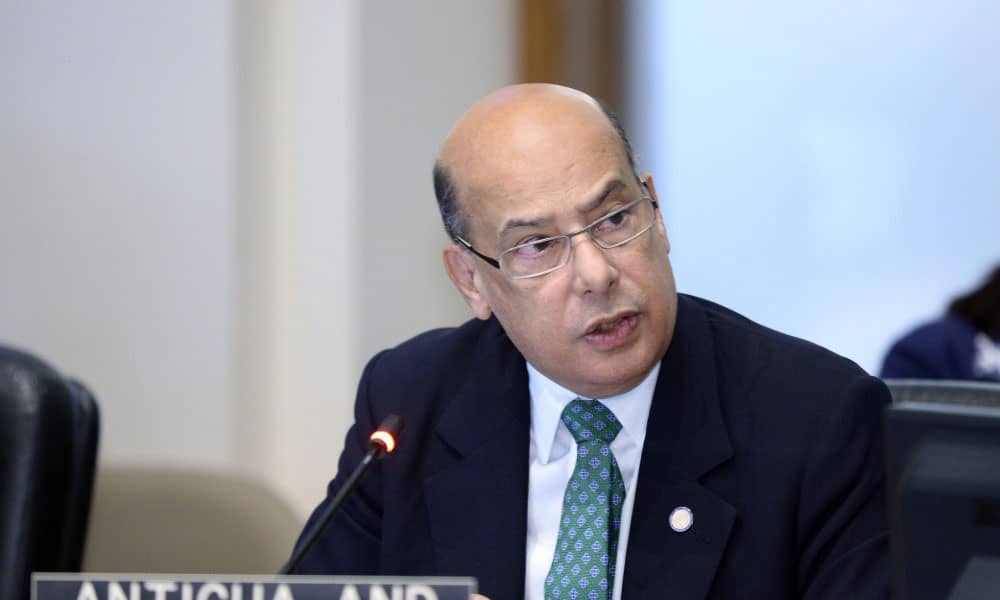
By Sir Ronald Sanders
On September 23, 2025, U.S. President Donald Trump used his address to the 80th session of the UN General Assembly to question the Organization’s purpose. He is not alone; leaders worldwide have asked the same question. “The UN has such tremendous potential,” he said, but it is “not even coming close,” and “empty words don’t solve war.” On that point, many would agree.
However, many countries contend that the UN falls short because real control rests with a few powerful states that wield veto power in the Security Council to serve perceived national interests. In consequence, the principles of the UN Charter – and at times international humanitarian law – are set aside, raising serious doubts about the system’s fairness.
As the General Assembly met, the point was driven home. By September 25, 2025, Israel had intensified operations in Gaza City and elsewhere, with rising casualties, mass displacement, and a deepening humanitarian emergency. The Integrated Food Security Phase Classification (IPC) confirmed famine in Gaza Governorate on August 22 and projected expansion to other areas by late September.
Global anger over the war and civilian suffering has broadened diplomatic responses. In the days around UNGA, the United Kingdom, Canada, France, Australia, and Portugal recognized the State of Palestine. Taken together, 157 of the UN’s 193 member states – about 81% – now recognize Palestine.
In his address, President Trump argued that recognizing Palestine would “reward” Hamas for the October 2023 attacks. By contrast, most countries that spoke, including Caribbean states, condemned Hamas while reaffirming that Palestinians have a right to statehood alongside Israel. Hostage releases and an end to indiscriminate attacks were widely demanded, as was a political track that pursues the institutionalization of two states.
Countries also stressed that grave concerns about violations of international humanitarian law must not be conflated with antisemitism. Criticism of the policies and actions of Prime Minister Benjamin Netanyahu’s government is not a commentary on Jewish people anywhere. The suffering and perseverance of Jewish communities are part of humanity’s collective memory; invoking that history to shield present policies from scrutiny is unjustifiable and diminishes the fight against antisemitism.
Perhaps the clearest divergence between President Trump and most UNGA speakers – especially small states – was on climate change. The President called climate change “the greatest con job ever perpetrated on the world”. For small islands, this is not ideology but survival: stronger storms, rising seas, and soaring insurance costs are already eroding economies. As Palau’s President Surangel Whipps Jr. put it during UNGA week, “Those with the greatest responsibility and the greatest capacity to act must do far more,” noting that an advisory opinion by the International Court of Justice grounds this in international law.

Talking about CO₂ emissions, the main driver of climate change, President Trump argued that Europe’s cuts had been “wiped out” by a global rise “much of it coming from China,” adding that “China now produces more CO₂ than all the other developed nations in the world.” Small states acknowledge the point, saying that it reinforces the case for all major emitters to cut. Notably, on September 24, 2025, China announced a target to cut its greenhouse-gas emissions by 7–10% below peak levels by 2035.
Small states, contributing least to CO₂ emissions yet suffering most, would agree with UN Secretary-General António Guterres, who put the issue plainly at a UNGA climate meeting: “The science demands action. The law commands it. The economics compel it. And people are calling for it.” He warned that current pledges are inadequate and linked the climate crisis to a wider risk – multipolarity without effective multilateral institutions “courts chaos.”
This exchange signals tougher terrain across UN institutions, including the Paris Agreement and COP talks. The U.S. has stepped back, while China’s assessed share of the UNFCCC budget is set to rise under the newly approved 2026–27 budget. This is a bureaucratic increase, not a new voluntary climate-finance pledge. Even so, U.S. policymakers should worry that their absence leaves more space for others to shape norms and agendas.
Small states, including in the Caribbean, want the United States engaged, not only for its resources, but because U.S. climate impacts spill across the neighbourhood, driving up insurance and transport costs that already-strained Caribbean and Central American economies struggle to absorb.
Caribbean states share President Trump’s often-stated desire for world peace. They welcomed his remarks on the war in Ukraine, following a meeting with President Volodymyr Zelenskyy in the margins of the UNGA. He said he now believes Ukraine can take back all its territory and urged quicker progress. Any U.S. initiative to secure such a development would be welcomed across the Caribbean.
So, is the UN still of value to small Caribbean states, despite big-power domination of Security Council decisions, influence over the UN’s budget and priorities, and sharp differences on vital matters? The answer is still yes, but with clear limits.
The UN remains the only place where all states are present, where the record is public, and where small countries can put their concerns on the agenda and – if they are brave and astute – question major powers. Specialized agencies still deliver concrete services that benefit small states. But credibility is strained when rules are applied unevenly, financing is volatile, science is treated as optional, and equity of membership is denied.
Small states do not have the luxury of disengagement. The task is to use what still works, while being clear that constraints come from members, not the Charter.
(The author is the Ambassador of Antigua and Barbuda to the United States and the OAS, and Dean of the OAS Ambassadors accredited to the OAS. Responses and previous commentaries: www.sirronaldsanders.com)
Advertise with the mоѕt vіѕіtеd nеwѕ ѕіtе іn Antigua!
We offer fully customizable and flexible digital marketing packages.
Contact us at [email protected]
















Congratulations to the African Countries on their presentation at the United Nation defending their stand for two Seat on the Security Council with Veto Powers An emergency meeting should be urgently conveen by the African Union to elect their representative also South American Countries like wise should do so
Well I have long time lost all hope in these organizations being nothing else but a talk shop. Nothing they do or say they can implement. Not even the Criminal Court in The Hague. A man wanted by the Criminal Court for War Crimes and Crime against Humanity can give them the middle finger and do as he wants and the biggest country in the world with the strongest military giving him all the cover he needs to move freely and welcome him in their midts. The world is run by the USA and we have to come to terms with that. One day will come when that Kingdom will fall, but that day is not anytime soon. We have a long way to go. I rather listen to the words of our prophet Robert “Bob” Neste Marley, when he sang the song WAR. Until the philosophy which hold one race
Superior and another Inferior
Is finally
And permanently
Discredited
And abandoned
Everywhere is war
Me say war
That until there are no longer
First-class and second-class citizens of any nation
Until the colour of a man’s skin
Is of no more significance than the colour of his eyes
Me say war
That until the basic human rights
Are equally guaranteed to all
Without regard to race
Dis a war
That until that day
The dream of lasting peace
World citizenship
Rule of international morality
Will remain in but a fleeting illusion to be pursued
But never attained
Now everywhere is war
War
And until the ignoble and unhappy regime
That hold our brothers in Angola
In Mozambique
South Africa
Sub-human bondage
Have been toppled
Utterly destroyed
Well, everywhere is war
Me say war
War in the east
War in the west
War up north
War down south
War, war
Rumors of war
And until that day
The African continent
Will not know peace
We Africans will fight, we find it necessary
And we know we shall win
As we are confident
In the victory
Of good over evil
Comments are closed.